Critical Analysis of a Nursing Episode of Care for a Dementia Patient
VerifiedAdded on 2021/02/20
|14
|3852
|1155
Report
AI Summary
This report provides a critical analysis of a nursing episode of care, specifically focusing on a patient with dementia. The analysis critically reviews the contributions nurses make in contemporary healthcare, emphasizing the importance of specialized care for dementia patients, including implementing routine activities, encouraging patient engagement, and building therapeutic relationships. The report reflects on the attitudes, values, and skills needed for nursing care, highlighting the importance of communication, empathy, and commitment, as well as the application of the Leading Change, Adding Value framework. Furthermore, it articulates key principles from the NMC code, such as public protection, safety maintenance, professional accountability, and confidentiality, underscoring the significance of evidence-based practice and the nurse-patient alliance in delivering quality care. The report emphasizes the role of nurses in advocating for patient autonomy and educating families, ultimately aiming to improve the patient's health outcomes and overall well-being.
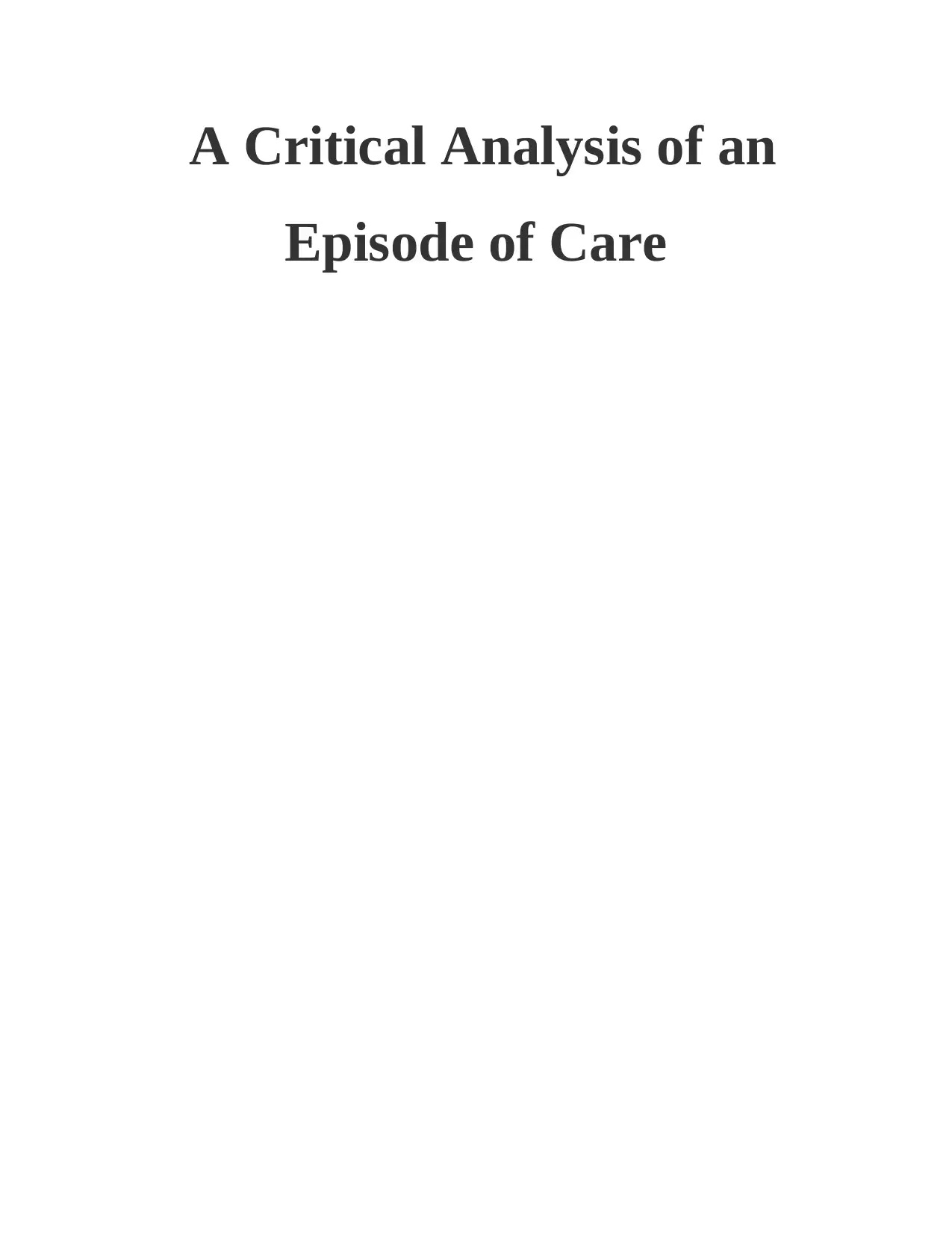
A Critical Analysis of an
Episode of Care
Episode of Care
Paraphrase This Document
Need a fresh take? Get an instant paraphrase of this document with our AI Paraphraser
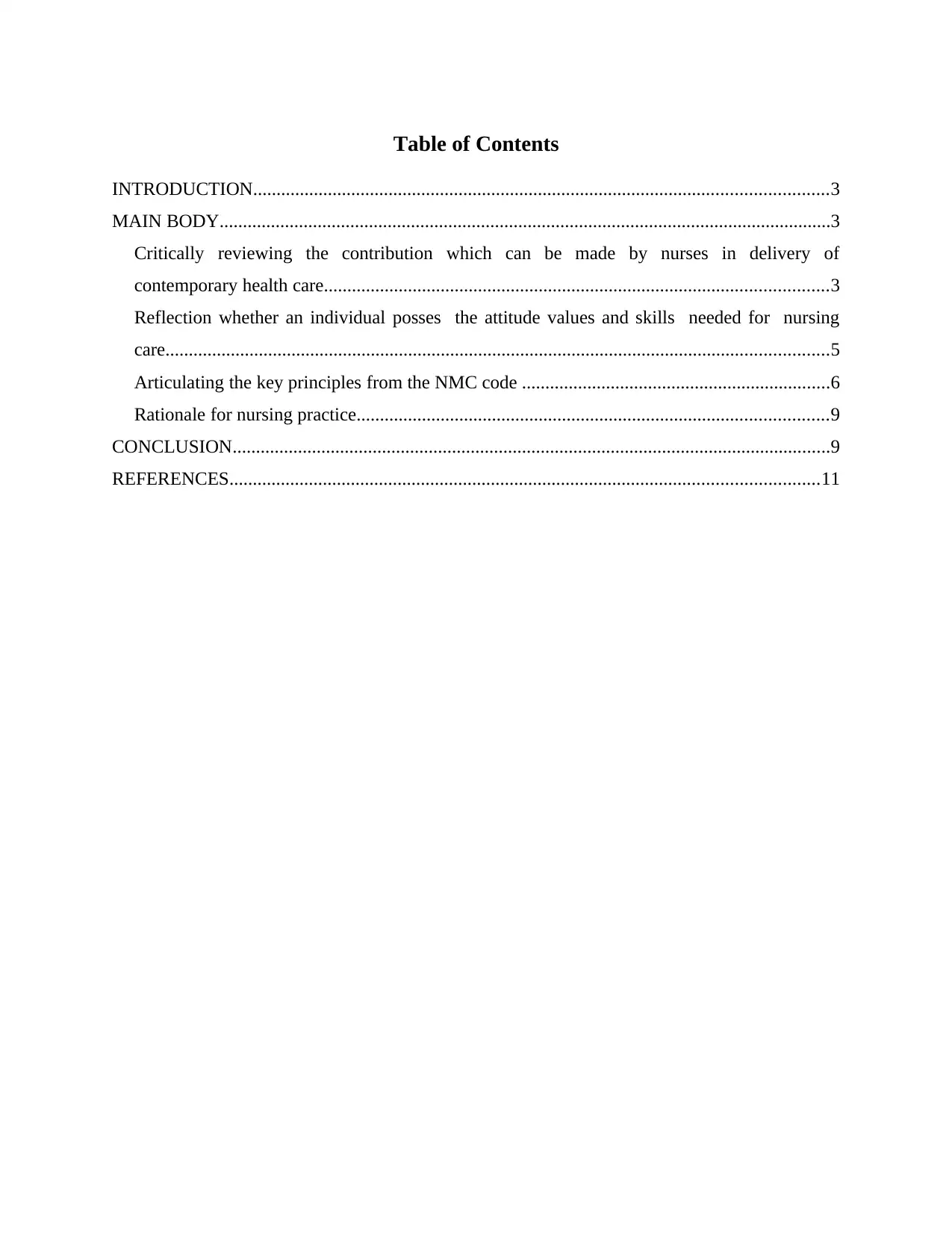
Table of Contents
INTRODUCTION...........................................................................................................................3
MAIN BODY...................................................................................................................................3
Critically reviewing the contribution which can be made by nurses in delivery of
contemporary health care............................................................................................................3
Reflection whether an individual posses the attitude values and skills needed for nursing
care..............................................................................................................................................5
Articulating the key principles from the NMC code ..................................................................6
Rationale for nursing practice.....................................................................................................9
CONCLUSION................................................................................................................................9
REFERENCES..............................................................................................................................11
INTRODUCTION...........................................................................................................................3
MAIN BODY...................................................................................................................................3
Critically reviewing the contribution which can be made by nurses in delivery of
contemporary health care............................................................................................................3
Reflection whether an individual posses the attitude values and skills needed for nursing
care..............................................................................................................................................5
Articulating the key principles from the NMC code ..................................................................6
Rationale for nursing practice.....................................................................................................9
CONCLUSION................................................................................................................................9
REFERENCES..............................................................................................................................11
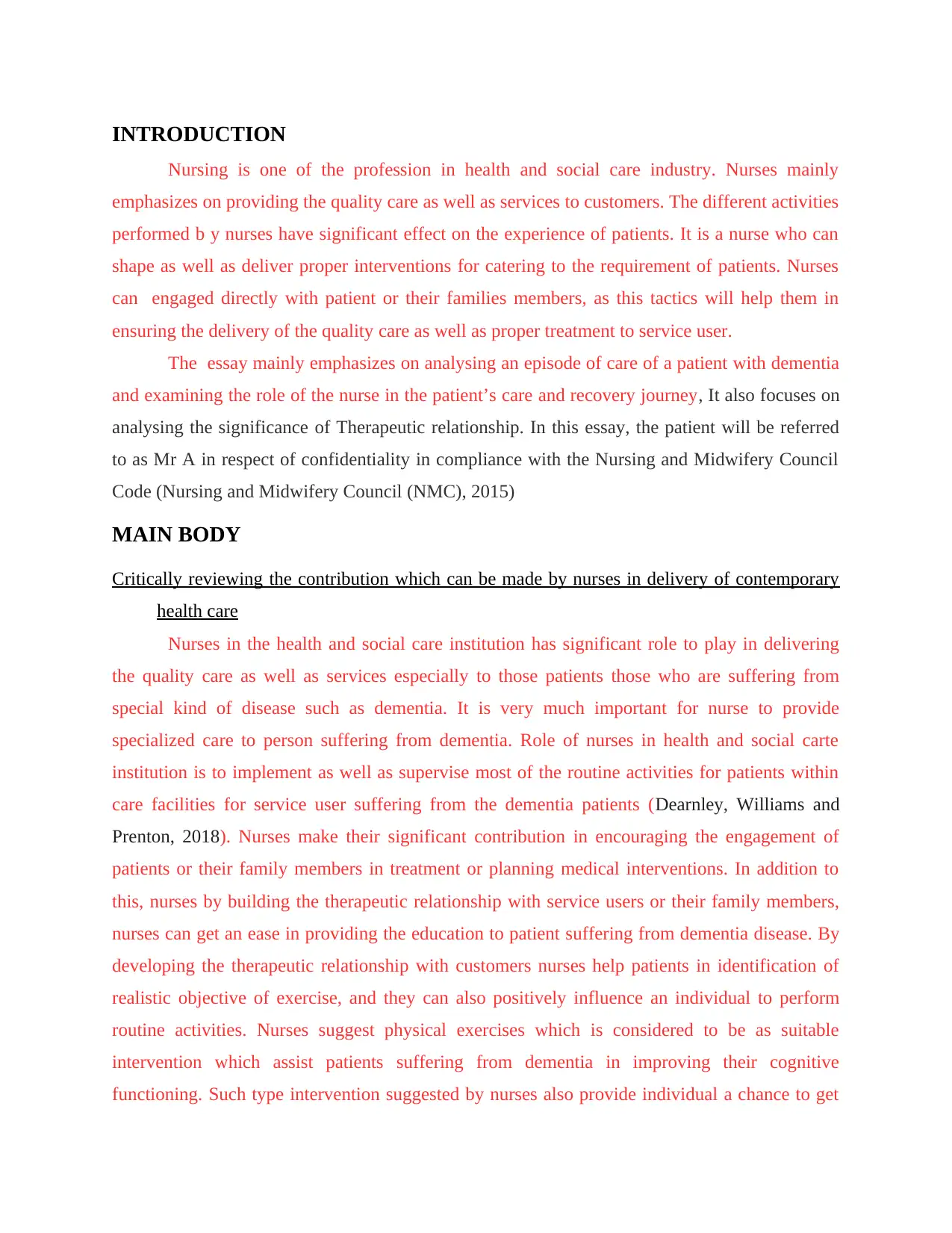
INTRODUCTION
Nursing is one of the profession in health and social care industry. Nurses mainly
emphasizes on providing the quality care as well as services to customers. The different activities
performed b y nurses have significant effect on the experience of patients. It is a nurse who can
shape as well as deliver proper interventions for catering to the requirement of patients. Nurses
can engaged directly with patient or their families members, as this tactics will help them in
ensuring the delivery of the quality care as well as proper treatment to service user.
The essay mainly emphasizes on analysing an episode of care of a patient with dementia
and examining the role of the nurse in the patient’s care and recovery journey, It also focuses on
analysing the significance of Therapeutic relationship. In this essay, the patient will be referred
to as Mr A in respect of confidentiality in compliance with the Nursing and Midwifery Council
Code (Nursing and Midwifery Council (NMC), 2015)
MAIN BODY
Critically reviewing the contribution which can be made by nurses in delivery of contemporary
health care
Nurses in the health and social care institution has significant role to play in delivering
the quality care as well as services especially to those patients those who are suffering from
special kind of disease such as dementia. It is very much important for nurse to provide
specialized care to person suffering from dementia. Role of nurses in health and social carte
institution is to implement as well as supervise most of the routine activities for patients within
care facilities for service user suffering from the dementia patients (Dearnley, Williams and
Prenton, 2018). Nurses make their significant contribution in encouraging the engagement of
patients or their family members in treatment or planning medical interventions. In addition to
this, nurses by building the therapeutic relationship with service users or their family members,
nurses can get an ease in providing the education to patient suffering from dementia disease. By
developing the therapeutic relationship with customers nurses help patients in identification of
realistic objective of exercise, and they can also positively influence an individual to perform
routine activities. Nurses suggest physical exercises which is considered to be as suitable
intervention which assist patients suffering from dementia in improving their cognitive
functioning. Such type intervention suggested by nurses also provide individual a chance to get
Nursing is one of the profession in health and social care industry. Nurses mainly
emphasizes on providing the quality care as well as services to customers. The different activities
performed b y nurses have significant effect on the experience of patients. It is a nurse who can
shape as well as deliver proper interventions for catering to the requirement of patients. Nurses
can engaged directly with patient or their families members, as this tactics will help them in
ensuring the delivery of the quality care as well as proper treatment to service user.
The essay mainly emphasizes on analysing an episode of care of a patient with dementia
and examining the role of the nurse in the patient’s care and recovery journey, It also focuses on
analysing the significance of Therapeutic relationship. In this essay, the patient will be referred
to as Mr A in respect of confidentiality in compliance with the Nursing and Midwifery Council
Code (Nursing and Midwifery Council (NMC), 2015)
MAIN BODY
Critically reviewing the contribution which can be made by nurses in delivery of contemporary
health care
Nurses in the health and social care institution has significant role to play in delivering
the quality care as well as services especially to those patients those who are suffering from
special kind of disease such as dementia. It is very much important for nurse to provide
specialized care to person suffering from dementia. Role of nurses in health and social carte
institution is to implement as well as supervise most of the routine activities for patients within
care facilities for service user suffering from the dementia patients (Dearnley, Williams and
Prenton, 2018). Nurses make their significant contribution in encouraging the engagement of
patients or their family members in treatment or planning medical interventions. In addition to
this, nurses by building the therapeutic relationship with service users or their family members,
nurses can get an ease in providing the education to patient suffering from dementia disease. By
developing the therapeutic relationship with customers nurses help patients in identification of
realistic objective of exercise, and they can also positively influence an individual to perform
routine activities. Nurses suggest physical exercises which is considered to be as suitable
intervention which assist patients suffering from dementia in improving their cognitive
functioning. Such type intervention suggested by nurses also provide individual a chance to get
⊘ This is a preview!⊘
Do you want full access?
Subscribe today to unlock all pages.

Trusted by 1+ million students worldwide
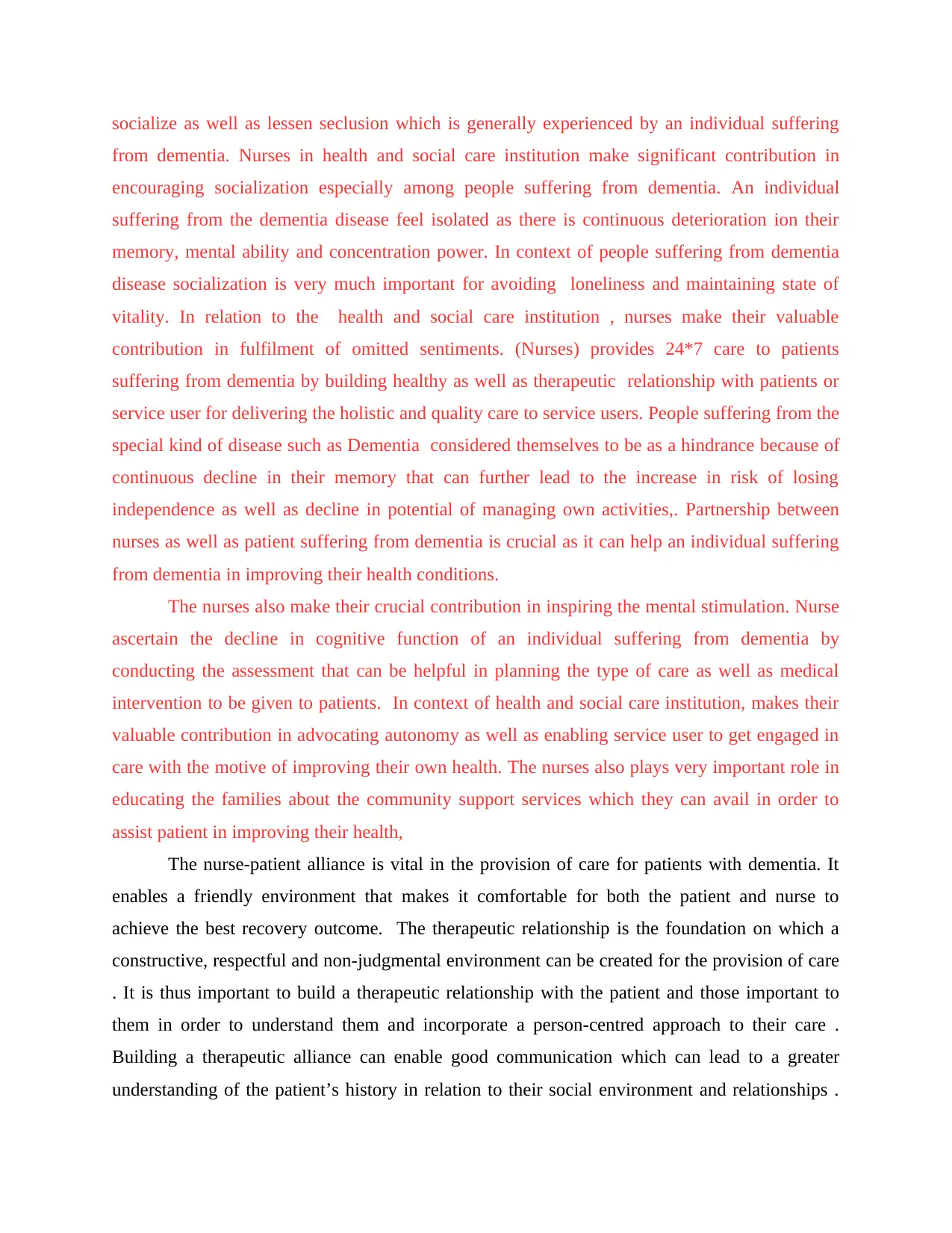
socialize as well as lessen seclusion which is generally experienced by an individual suffering
from dementia. Nurses in health and social care institution make significant contribution in
encouraging socialization especially among people suffering from dementia. An individual
suffering from the dementia disease feel isolated as there is continuous deterioration ion their
memory, mental ability and concentration power. In context of people suffering from dementia
disease socialization is very much important for avoiding loneliness and maintaining state of
vitality. In relation to the health and social care institution , nurses make their valuable
contribution in fulfilment of omitted sentiments. (Nurses) provides 24*7 care to patients
suffering from dementia by building healthy as well as therapeutic relationship with patients or
service user for delivering the holistic and quality care to service users. People suffering from the
special kind of disease such as Dementia considered themselves to be as a hindrance because of
continuous decline in their memory that can further lead to the increase in risk of losing
independence as well as decline in potential of managing own activities,. Partnership between
nurses as well as patient suffering from dementia is crucial as it can help an individual suffering
from dementia in improving their health conditions.
The nurses also make their crucial contribution in inspiring the mental stimulation. Nurse
ascertain the decline in cognitive function of an individual suffering from dementia by
conducting the assessment that can be helpful in planning the type of care as well as medical
intervention to be given to patients. In context of health and social care institution, makes their
valuable contribution in advocating autonomy as well as enabling service user to get engaged in
care with the motive of improving their own health. The nurses also plays very important role in
educating the families about the community support services which they can avail in order to
assist patient in improving their health,
The nurse-patient alliance is vital in the provision of care for patients with dementia. It
enables a friendly environment that makes it comfortable for both the patient and nurse to
achieve the best recovery outcome. The therapeutic relationship is the foundation on which a
constructive, respectful and non-judgmental environment can be created for the provision of care
. It is thus important to build a therapeutic relationship with the patient and those important to
them in order to understand them and incorporate a person-centred approach to their care .
Building a therapeutic alliance can enable good communication which can lead to a greater
understanding of the patient’s history in relation to their social environment and relationships .
from dementia. Nurses in health and social care institution make significant contribution in
encouraging socialization especially among people suffering from dementia. An individual
suffering from the dementia disease feel isolated as there is continuous deterioration ion their
memory, mental ability and concentration power. In context of people suffering from dementia
disease socialization is very much important for avoiding loneliness and maintaining state of
vitality. In relation to the health and social care institution , nurses make their valuable
contribution in fulfilment of omitted sentiments. (Nurses) provides 24*7 care to patients
suffering from dementia by building healthy as well as therapeutic relationship with patients or
service user for delivering the holistic and quality care to service users. People suffering from the
special kind of disease such as Dementia considered themselves to be as a hindrance because of
continuous decline in their memory that can further lead to the increase in risk of losing
independence as well as decline in potential of managing own activities,. Partnership between
nurses as well as patient suffering from dementia is crucial as it can help an individual suffering
from dementia in improving their health conditions.
The nurses also make their crucial contribution in inspiring the mental stimulation. Nurse
ascertain the decline in cognitive function of an individual suffering from dementia by
conducting the assessment that can be helpful in planning the type of care as well as medical
intervention to be given to patients. In context of health and social care institution, makes their
valuable contribution in advocating autonomy as well as enabling service user to get engaged in
care with the motive of improving their own health. The nurses also plays very important role in
educating the families about the community support services which they can avail in order to
assist patient in improving their health,
The nurse-patient alliance is vital in the provision of care for patients with dementia. It
enables a friendly environment that makes it comfortable for both the patient and nurse to
achieve the best recovery outcome. The therapeutic relationship is the foundation on which a
constructive, respectful and non-judgmental environment can be created for the provision of care
. It is thus important to build a therapeutic relationship with the patient and those important to
them in order to understand them and incorporate a person-centred approach to their care .
Building a therapeutic alliance can enable good communication which can lead to a greater
understanding of the patient’s history in relation to their social environment and relationships .
Paraphrase This Document
Need a fresh take? Get an instant paraphrase of this document with our AI Paraphraser
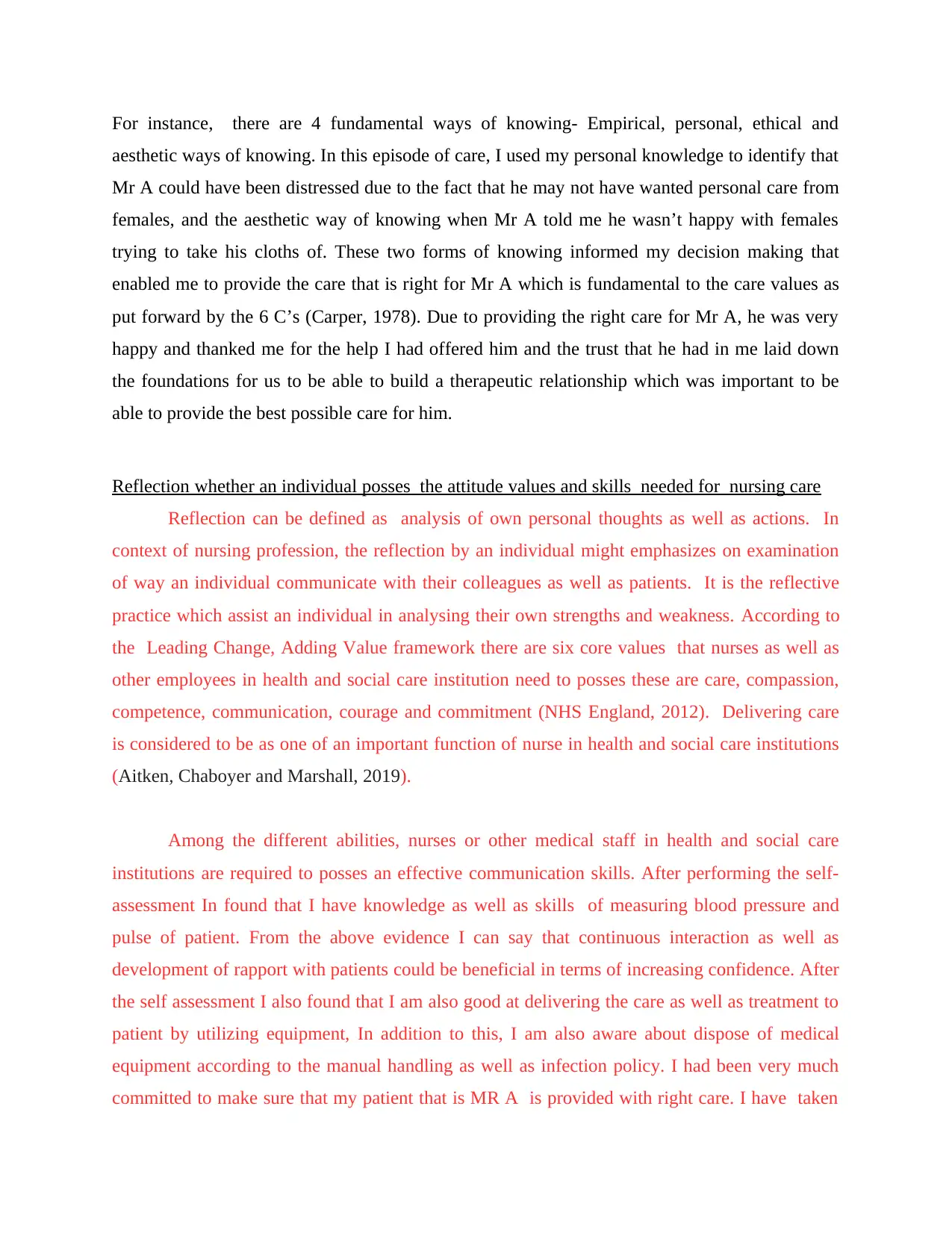
For instance, there are 4 fundamental ways of knowing- Empirical, personal, ethical and
aesthetic ways of knowing. In this episode of care, I used my personal knowledge to identify that
Mr A could have been distressed due to the fact that he may not have wanted personal care from
females, and the aesthetic way of knowing when Mr A told me he wasn’t happy with females
trying to take his cloths of. These two forms of knowing informed my decision making that
enabled me to provide the care that is right for Mr A which is fundamental to the care values as
put forward by the 6 C’s (Carper, 1978). Due to providing the right care for Mr A, he was very
happy and thanked me for the help I had offered him and the trust that he had in me laid down
the foundations for us to be able to build a therapeutic relationship which was important to be
able to provide the best possible care for him.
Reflection whether an individual posses the attitude values and skills needed for nursing care
Reflection can be defined as analysis of own personal thoughts as well as actions. In
context of nursing profession, the reflection by an individual might emphasizes on examination
of way an individual communicate with their colleagues as well as patients. It is the reflective
practice which assist an individual in analysing their own strengths and weakness. According to
the Leading Change, Adding Value framework there are six core values that nurses as well as
other employees in health and social care institution need to posses these are care, compassion,
competence, communication, courage and commitment (NHS England, 2012). Delivering care
is considered to be as one of an important function of nurse in health and social care institutions
(Aitken, Chaboyer and Marshall, 2019).
Among the different abilities, nurses or other medical staff in health and social care
institutions are required to posses an effective communication skills. After performing the self-
assessment In found that I have knowledge as well as skills of measuring blood pressure and
pulse of patient. From the above evidence I can say that continuous interaction as well as
development of rapport with patients could be beneficial in terms of increasing confidence. After
the self assessment I also found that I am also good at delivering the care as well as treatment to
patient by utilizing equipment, In addition to this, I am also aware about dispose of medical
equipment according to the manual handling as well as infection policy. I had been very much
committed to make sure that my patient that is MR A is provided with right care. I have taken
aesthetic ways of knowing. In this episode of care, I used my personal knowledge to identify that
Mr A could have been distressed due to the fact that he may not have wanted personal care from
females, and the aesthetic way of knowing when Mr A told me he wasn’t happy with females
trying to take his cloths of. These two forms of knowing informed my decision making that
enabled me to provide the care that is right for Mr A which is fundamental to the care values as
put forward by the 6 C’s (Carper, 1978). Due to providing the right care for Mr A, he was very
happy and thanked me for the help I had offered him and the trust that he had in me laid down
the foundations for us to be able to build a therapeutic relationship which was important to be
able to provide the best possible care for him.
Reflection whether an individual posses the attitude values and skills needed for nursing care
Reflection can be defined as analysis of own personal thoughts as well as actions. In
context of nursing profession, the reflection by an individual might emphasizes on examination
of way an individual communicate with their colleagues as well as patients. It is the reflective
practice which assist an individual in analysing their own strengths and weakness. According to
the Leading Change, Adding Value framework there are six core values that nurses as well as
other employees in health and social care institution need to posses these are care, compassion,
competence, communication, courage and commitment (NHS England, 2012). Delivering care
is considered to be as one of an important function of nurse in health and social care institutions
(Aitken, Chaboyer and Marshall, 2019).
Among the different abilities, nurses or other medical staff in health and social care
institutions are required to posses an effective communication skills. After performing the self-
assessment In found that I have knowledge as well as skills of measuring blood pressure and
pulse of patient. From the above evidence I can say that continuous interaction as well as
development of rapport with patients could be beneficial in terms of increasing confidence. After
the self assessment I also found that I am also good at delivering the care as well as treatment to
patient by utilizing equipment, In addition to this, I am also aware about dispose of medical
equipment according to the manual handling as well as infection policy. I had been very much
committed to make sure that my patient that is MR A is provided with right care. I have taken
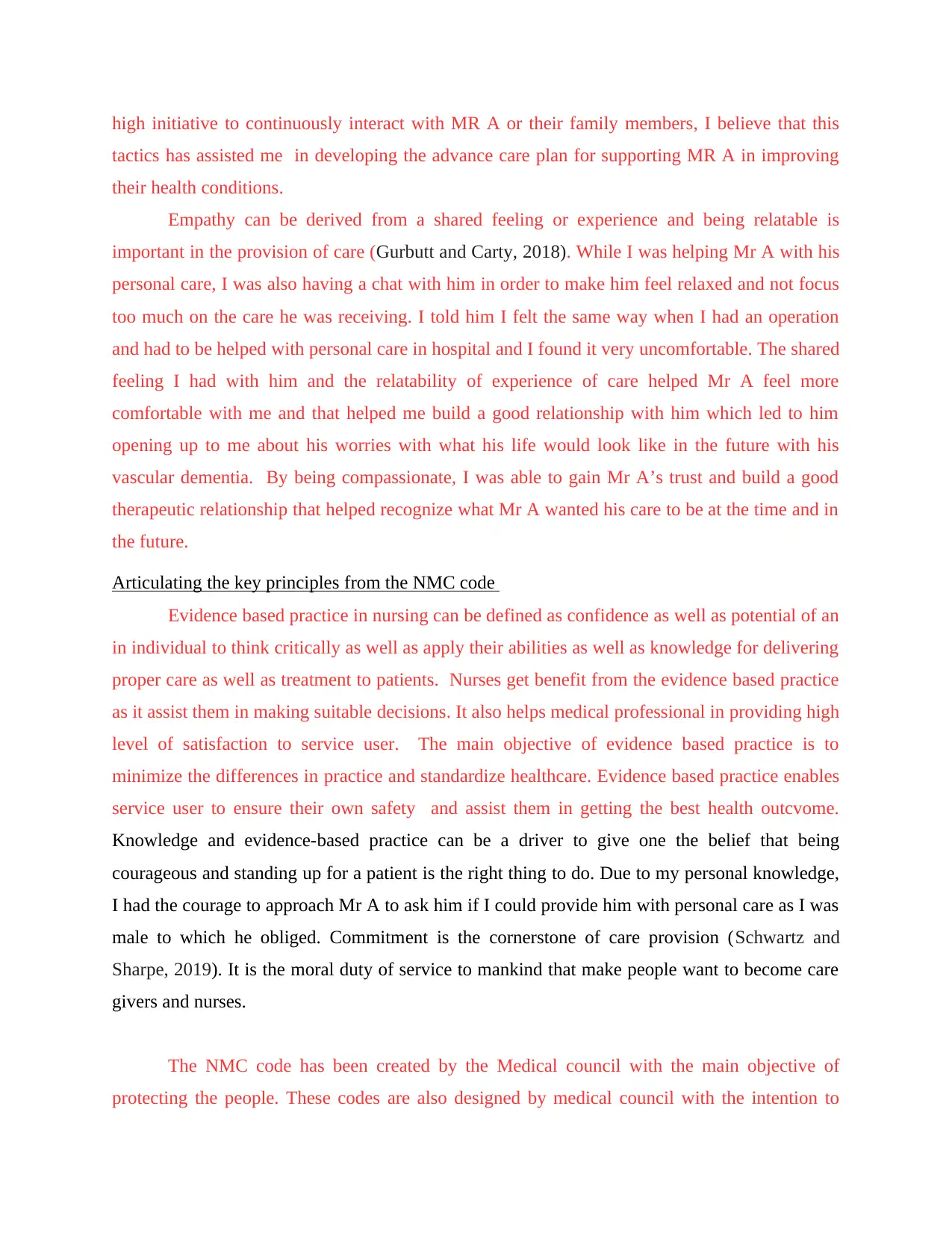
high initiative to continuously interact with MR A or their family members, I believe that this
tactics has assisted me in developing the advance care plan for supporting MR A in improving
their health conditions.
Empathy can be derived from a shared feeling or experience and being relatable is
important in the provision of care (Gurbutt and Carty, 2018). While I was helping Mr A with his
personal care, I was also having a chat with him in order to make him feel relaxed and not focus
too much on the care he was receiving. I told him I felt the same way when I had an operation
and had to be helped with personal care in hospital and I found it very uncomfortable. The shared
feeling I had with him and the relatability of experience of care helped Mr A feel more
comfortable with me and that helped me build a good relationship with him which led to him
opening up to me about his worries with what his life would look like in the future with his
vascular dementia. By being compassionate, I was able to gain Mr A’s trust and build a good
therapeutic relationship that helped recognize what Mr A wanted his care to be at the time and in
the future.
Articulating the key principles from the NMC code
Evidence based practice in nursing can be defined as confidence as well as potential of an
in individual to think critically as well as apply their abilities as well as knowledge for delivering
proper care as well as treatment to patients. Nurses get benefit from the evidence based practice
as it assist them in making suitable decisions. It also helps medical professional in providing high
level of satisfaction to service user. The main objective of evidence based practice is to
minimize the differences in practice and standardize healthcare. Evidence based practice enables
service user to ensure their own safety and assist them in getting the best health outcvome.
Knowledge and evidence-based practice can be a driver to give one the belief that being
courageous and standing up for a patient is the right thing to do. Due to my personal knowledge,
I had the courage to approach Mr A to ask him if I could provide him with personal care as I was
male to which he obliged. Commitment is the cornerstone of care provision (Schwartz and
Sharpe, 2019). It is the moral duty of service to mankind that make people want to become care
givers and nurses.
The NMC code has been created by the Medical council with the main objective of
protecting the people. These codes are also designed by medical council with the intention to
tactics has assisted me in developing the advance care plan for supporting MR A in improving
their health conditions.
Empathy can be derived from a shared feeling or experience and being relatable is
important in the provision of care (Gurbutt and Carty, 2018). While I was helping Mr A with his
personal care, I was also having a chat with him in order to make him feel relaxed and not focus
too much on the care he was receiving. I told him I felt the same way when I had an operation
and had to be helped with personal care in hospital and I found it very uncomfortable. The shared
feeling I had with him and the relatability of experience of care helped Mr A feel more
comfortable with me and that helped me build a good relationship with him which led to him
opening up to me about his worries with what his life would look like in the future with his
vascular dementia. By being compassionate, I was able to gain Mr A’s trust and build a good
therapeutic relationship that helped recognize what Mr A wanted his care to be at the time and in
the future.
Articulating the key principles from the NMC code
Evidence based practice in nursing can be defined as confidence as well as potential of an
in individual to think critically as well as apply their abilities as well as knowledge for delivering
proper care as well as treatment to patients. Nurses get benefit from the evidence based practice
as it assist them in making suitable decisions. It also helps medical professional in providing high
level of satisfaction to service user. The main objective of evidence based practice is to
minimize the differences in practice and standardize healthcare. Evidence based practice enables
service user to ensure their own safety and assist them in getting the best health outcvome.
Knowledge and evidence-based practice can be a driver to give one the belief that being
courageous and standing up for a patient is the right thing to do. Due to my personal knowledge,
I had the courage to approach Mr A to ask him if I could provide him with personal care as I was
male to which he obliged. Commitment is the cornerstone of care provision (Schwartz and
Sharpe, 2019). It is the moral duty of service to mankind that make people want to become care
givers and nurses.
The NMC code has been created by the Medical council with the main objective of
protecting the people. These codes are also designed by medical council with the intention to
⊘ This is a preview!⊘
Do you want full access?
Subscribe today to unlock all pages.

Trusted by 1+ million students worldwide
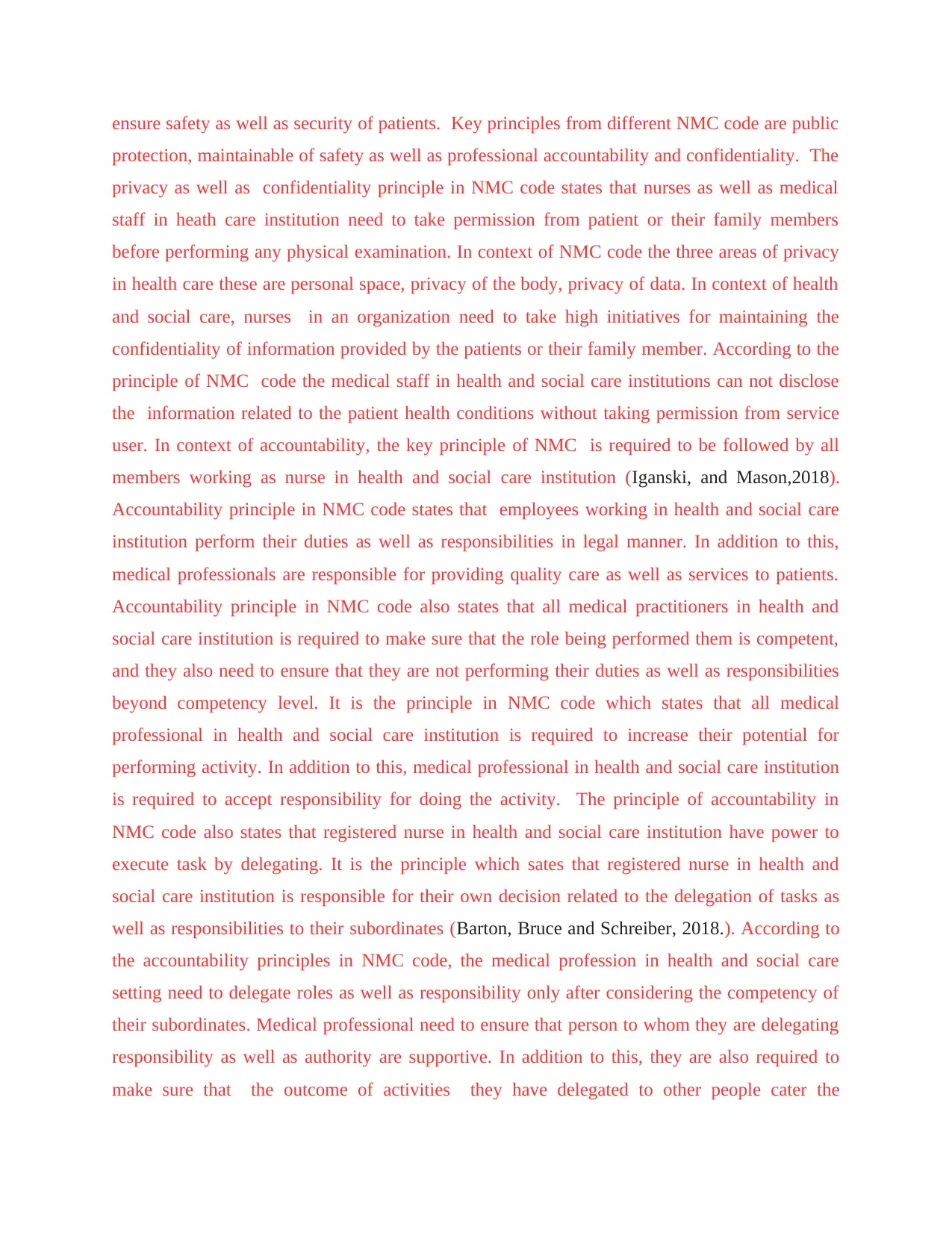
ensure safety as well as security of patients. Key principles from different NMC code are public
protection, maintainable of safety as well as professional accountability and confidentiality. The
privacy as well as confidentiality principle in NMC code states that nurses as well as medical
staff in heath care institution need to take permission from patient or their family members
before performing any physical examination. In context of NMC code the three areas of privacy
in health care these are personal space, privacy of the body, privacy of data. In context of health
and social care, nurses in an organization need to take high initiatives for maintaining the
confidentiality of information provided by the patients or their family member. According to the
principle of NMC code the medical staff in health and social care institutions can not disclose
the information related to the patient health conditions without taking permission from service
user. In context of accountability, the key principle of NMC is required to be followed by all
members working as nurse in health and social care institution (Iganski, and Mason,2018).
Accountability principle in NMC code states that employees working in health and social care
institution perform their duties as well as responsibilities in legal manner. In addition to this,
medical professionals are responsible for providing quality care as well as services to patients.
Accountability principle in NMC code also states that all medical practitioners in health and
social care institution is required to make sure that the role being performed them is competent,
and they also need to ensure that they are not performing their duties as well as responsibilities
beyond competency level. It is the principle in NMC code which states that all medical
professional in health and social care institution is required to increase their potential for
performing activity. In addition to this, medical professional in health and social care institution
is required to accept responsibility for doing the activity. The principle of accountability in
NMC code also states that registered nurse in health and social care institution have power to
execute task by delegating. It is the principle which sates that registered nurse in health and
social care institution is responsible for their own decision related to the delegation of tasks as
well as responsibilities to their subordinates (Barton, Bruce and Schreiber, 2018.). According to
the accountability principles in NMC code, the medical profession in health and social care
setting need to delegate roles as well as responsibility only after considering the competency of
their subordinates. Medical professional need to ensure that person to whom they are delegating
responsibility as well as authority are supportive. In addition to this, they are also required to
make sure that the outcome of activities they have delegated to other people cater the
protection, maintainable of safety as well as professional accountability and confidentiality. The
privacy as well as confidentiality principle in NMC code states that nurses as well as medical
staff in heath care institution need to take permission from patient or their family members
before performing any physical examination. In context of NMC code the three areas of privacy
in health care these are personal space, privacy of the body, privacy of data. In context of health
and social care, nurses in an organization need to take high initiatives for maintaining the
confidentiality of information provided by the patients or their family member. According to the
principle of NMC code the medical staff in health and social care institutions can not disclose
the information related to the patient health conditions without taking permission from service
user. In context of accountability, the key principle of NMC is required to be followed by all
members working as nurse in health and social care institution (Iganski, and Mason,2018).
Accountability principle in NMC code states that employees working in health and social care
institution perform their duties as well as responsibilities in legal manner. In addition to this,
medical professionals are responsible for providing quality care as well as services to patients.
Accountability principle in NMC code also states that all medical practitioners in health and
social care institution is required to make sure that the role being performed them is competent,
and they also need to ensure that they are not performing their duties as well as responsibilities
beyond competency level. It is the principle in NMC code which states that all medical
professional in health and social care institution is required to increase their potential for
performing activity. In addition to this, medical professional in health and social care institution
is required to accept responsibility for doing the activity. The principle of accountability in
NMC code also states that registered nurse in health and social care institution have power to
execute task by delegating. It is the principle which sates that registered nurse in health and
social care institution is responsible for their own decision related to the delegation of tasks as
well as responsibilities to their subordinates (Barton, Bruce and Schreiber, 2018.). According to
the accountability principles in NMC code, the medical profession in health and social care
setting need to delegate roles as well as responsibility only after considering the competency of
their subordinates. Medical professional need to ensure that person to whom they are delegating
responsibility as well as authority are supportive. In addition to this, they are also required to
make sure that the outcome of activities they have delegated to other people cater the
Paraphrase This Document
Need a fresh take? Get an instant paraphrase of this document with our AI Paraphraser
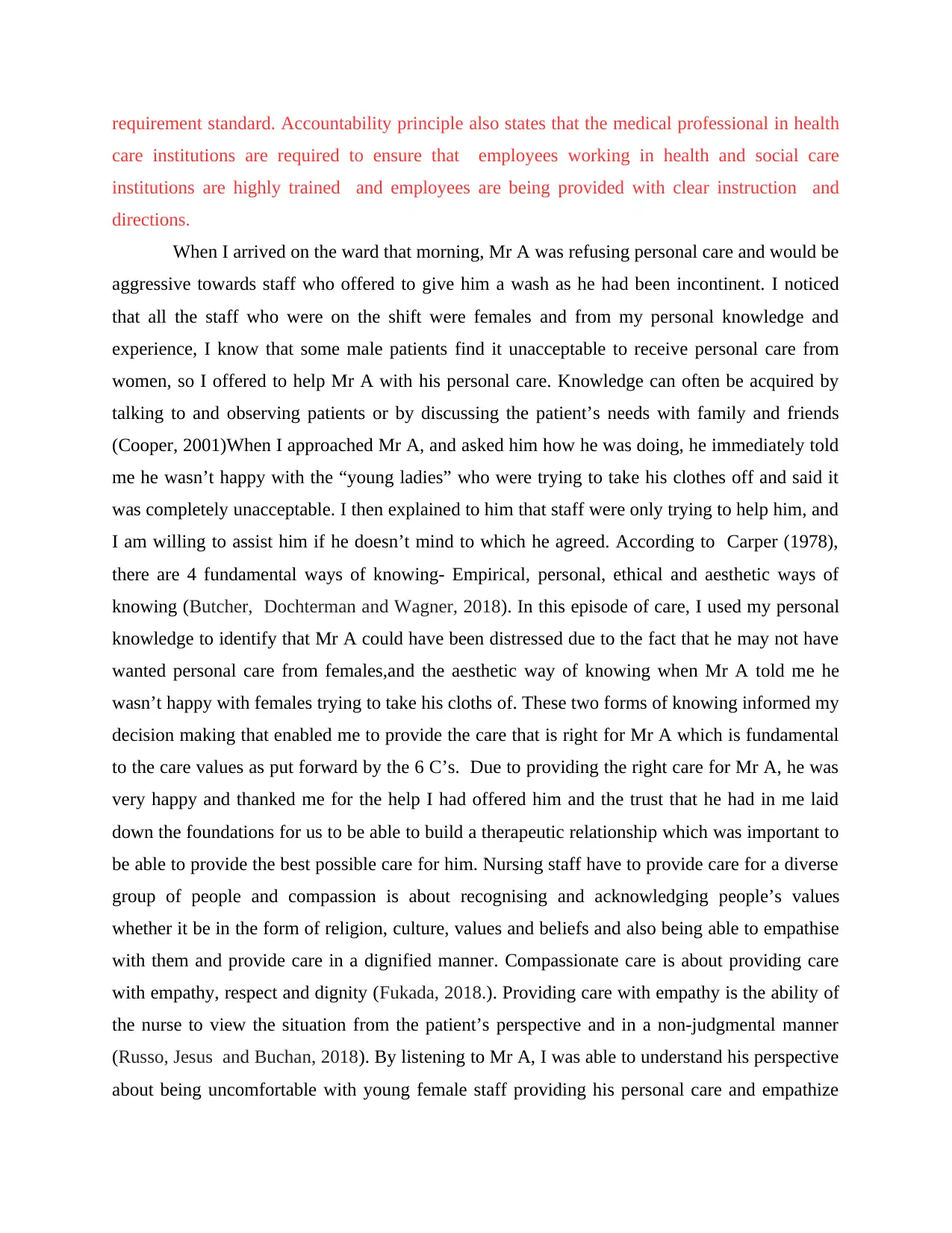
requirement standard. Accountability principle also states that the medical professional in health
care institutions are required to ensure that employees working in health and social care
institutions are highly trained and employees are being provided with clear instruction and
directions.
When I arrived on the ward that morning, Mr A was refusing personal care and would be
aggressive towards staff who offered to give him a wash as he had been incontinent. I noticed
that all the staff who were on the shift were females and from my personal knowledge and
experience, I know that some male patients find it unacceptable to receive personal care from
women, so I offered to help Mr A with his personal care. Knowledge can often be acquired by
talking to and observing patients or by discussing the patient’s needs with family and friends
(Cooper, 2001)When I approached Mr A, and asked him how he was doing, he immediately told
me he wasn’t happy with the “young ladies” who were trying to take his clothes off and said it
was completely unacceptable. I then explained to him that staff were only trying to help him, and
I am willing to assist him if he doesn’t mind to which he agreed. According to Carper (1978),
there are 4 fundamental ways of knowing- Empirical, personal, ethical and aesthetic ways of
knowing (Butcher, Dochterman and Wagner, 2018). In this episode of care, I used my personal
knowledge to identify that Mr A could have been distressed due to the fact that he may not have
wanted personal care from females,and the aesthetic way of knowing when Mr A told me he
wasn’t happy with females trying to take his cloths of. These two forms of knowing informed my
decision making that enabled me to provide the care that is right for Mr A which is fundamental
to the care values as put forward by the 6 C’s. Due to providing the right care for Mr A, he was
very happy and thanked me for the help I had offered him and the trust that he had in me laid
down the foundations for us to be able to build a therapeutic relationship which was important to
be able to provide the best possible care for him. Nursing staff have to provide care for a diverse
group of people and compassion is about recognising and acknowledging people’s values
whether it be in the form of religion, culture, values and beliefs and also being able to empathise
with them and provide care in a dignified manner. Compassionate care is about providing care
with empathy, respect and dignity (Fukada, 2018.). Providing care with empathy is the ability of
the nurse to view the situation from the patient’s perspective and in a non-judgmental manner
(Russo, Jesus and Buchan, 2018). By listening to Mr A, I was able to understand his perspective
about being uncomfortable with young female staff providing his personal care and empathize
care institutions are required to ensure that employees working in health and social care
institutions are highly trained and employees are being provided with clear instruction and
directions.
When I arrived on the ward that morning, Mr A was refusing personal care and would be
aggressive towards staff who offered to give him a wash as he had been incontinent. I noticed
that all the staff who were on the shift were females and from my personal knowledge and
experience, I know that some male patients find it unacceptable to receive personal care from
women, so I offered to help Mr A with his personal care. Knowledge can often be acquired by
talking to and observing patients or by discussing the patient’s needs with family and friends
(Cooper, 2001)When I approached Mr A, and asked him how he was doing, he immediately told
me he wasn’t happy with the “young ladies” who were trying to take his clothes off and said it
was completely unacceptable. I then explained to him that staff were only trying to help him, and
I am willing to assist him if he doesn’t mind to which he agreed. According to Carper (1978),
there are 4 fundamental ways of knowing- Empirical, personal, ethical and aesthetic ways of
knowing (Butcher, Dochterman and Wagner, 2018). In this episode of care, I used my personal
knowledge to identify that Mr A could have been distressed due to the fact that he may not have
wanted personal care from females,and the aesthetic way of knowing when Mr A told me he
wasn’t happy with females trying to take his cloths of. These two forms of knowing informed my
decision making that enabled me to provide the care that is right for Mr A which is fundamental
to the care values as put forward by the 6 C’s. Due to providing the right care for Mr A, he was
very happy and thanked me for the help I had offered him and the trust that he had in me laid
down the foundations for us to be able to build a therapeutic relationship which was important to
be able to provide the best possible care for him. Nursing staff have to provide care for a diverse
group of people and compassion is about recognising and acknowledging people’s values
whether it be in the form of religion, culture, values and beliefs and also being able to empathise
with them and provide care in a dignified manner. Compassionate care is about providing care
with empathy, respect and dignity (Fukada, 2018.). Providing care with empathy is the ability of
the nurse to view the situation from the patient’s perspective and in a non-judgmental manner
(Russo, Jesus and Buchan, 2018). By listening to Mr A, I was able to understand his perspective
about being uncomfortable with young female staff providing his personal care and empathize
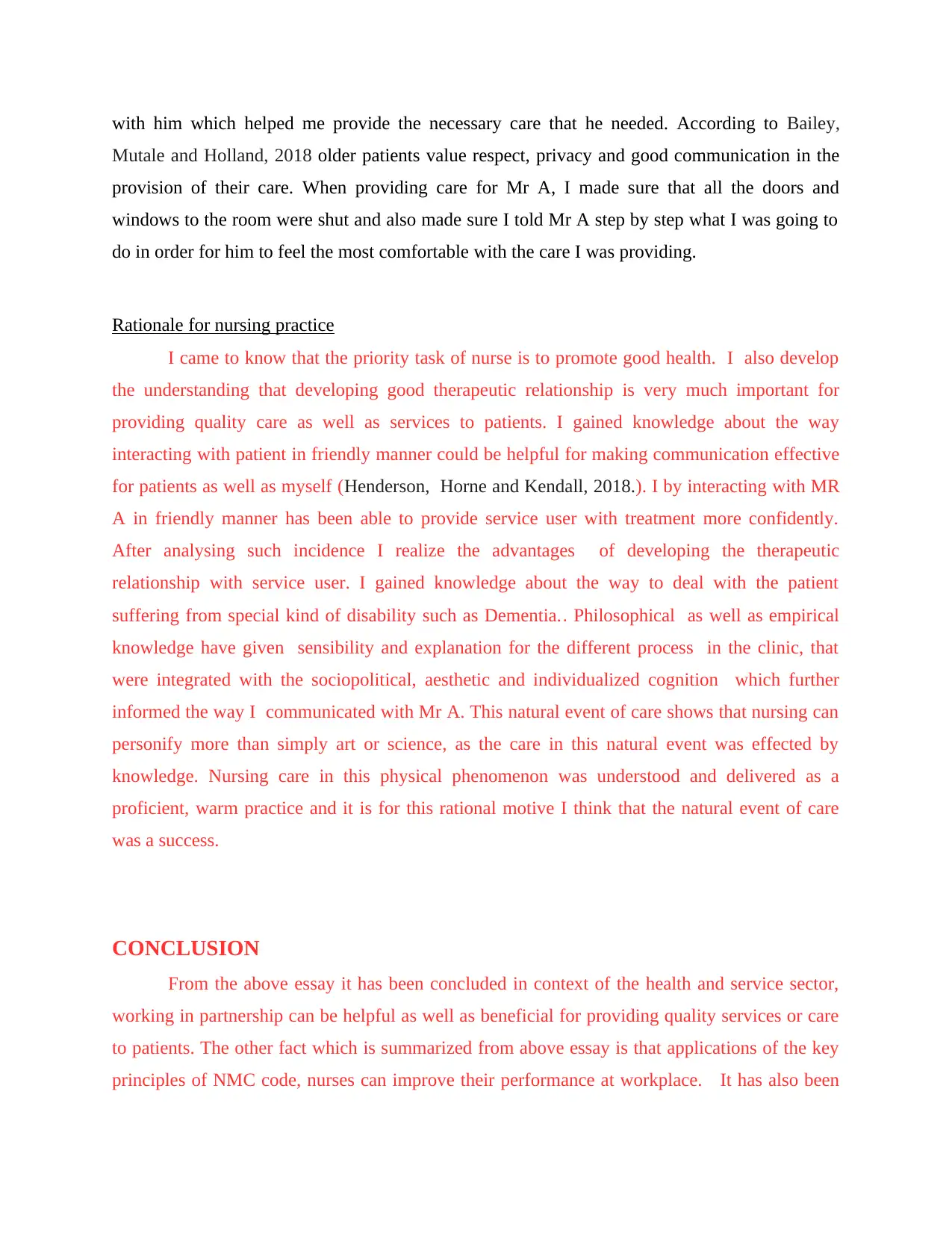
with him which helped me provide the necessary care that he needed. According to Bailey,
Mutale and Holland, 2018 older patients value respect, privacy and good communication in the
provision of their care. When providing care for Mr A, I made sure that all the doors and
windows to the room were shut and also made sure I told Mr A step by step what I was going to
do in order for him to feel the most comfortable with the care I was providing.
Rationale for nursing practice
I came to know that the priority task of nurse is to promote good health. I also develop
the understanding that developing good therapeutic relationship is very much important for
providing quality care as well as services to patients. I gained knowledge about the way
interacting with patient in friendly manner could be helpful for making communication effective
for patients as well as myself (Henderson, Horne and Kendall, 2018.). I by interacting with MR
A in friendly manner has been able to provide service user with treatment more confidently.
After analysing such incidence I realize the advantages of developing the therapeutic
relationship with service user. I gained knowledge about the way to deal with the patient
suffering from special kind of disability such as Dementia.. Philosophical as well as empirical
knowledge have given sensibility and explanation for the different process in the clinic, that
were integrated with the sociopolitical, aesthetic and individualized cognition which further
informed the way I communicated with Mr A. This natural event of care shows that nursing can
personify more than simply art or science, as the care in this natural event was effected by
knowledge. Nursing care in this physical phenomenon was understood and delivered as a
proficient, warm practice and it is for this rational motive I think that the natural event of care
was a success.
CONCLUSION
From the above essay it has been concluded in context of the health and service sector,
working in partnership can be helpful as well as beneficial for providing quality services or care
to patients. The other fact which is summarized from above essay is that applications of the key
principles of NMC code, nurses can improve their performance at workplace. It has also been
Mutale and Holland, 2018 older patients value respect, privacy and good communication in the
provision of their care. When providing care for Mr A, I made sure that all the doors and
windows to the room were shut and also made sure I told Mr A step by step what I was going to
do in order for him to feel the most comfortable with the care I was providing.
Rationale for nursing practice
I came to know that the priority task of nurse is to promote good health. I also develop
the understanding that developing good therapeutic relationship is very much important for
providing quality care as well as services to patients. I gained knowledge about the way
interacting with patient in friendly manner could be helpful for making communication effective
for patients as well as myself (Henderson, Horne and Kendall, 2018.). I by interacting with MR
A in friendly manner has been able to provide service user with treatment more confidently.
After analysing such incidence I realize the advantages of developing the therapeutic
relationship with service user. I gained knowledge about the way to deal with the patient
suffering from special kind of disability such as Dementia.. Philosophical as well as empirical
knowledge have given sensibility and explanation for the different process in the clinic, that
were integrated with the sociopolitical, aesthetic and individualized cognition which further
informed the way I communicated with Mr A. This natural event of care shows that nursing can
personify more than simply art or science, as the care in this natural event was effected by
knowledge. Nursing care in this physical phenomenon was understood and delivered as a
proficient, warm practice and it is for this rational motive I think that the natural event of care
was a success.
CONCLUSION
From the above essay it has been concluded in context of the health and service sector,
working in partnership can be helpful as well as beneficial for providing quality services or care
to patients. The other fact which is summarized from above essay is that applications of the key
principles of NMC code, nurses can improve their performance at workplace. It has also been
⊘ This is a preview!⊘
Do you want full access?
Subscribe today to unlock all pages.

Trusted by 1+ million students worldwide
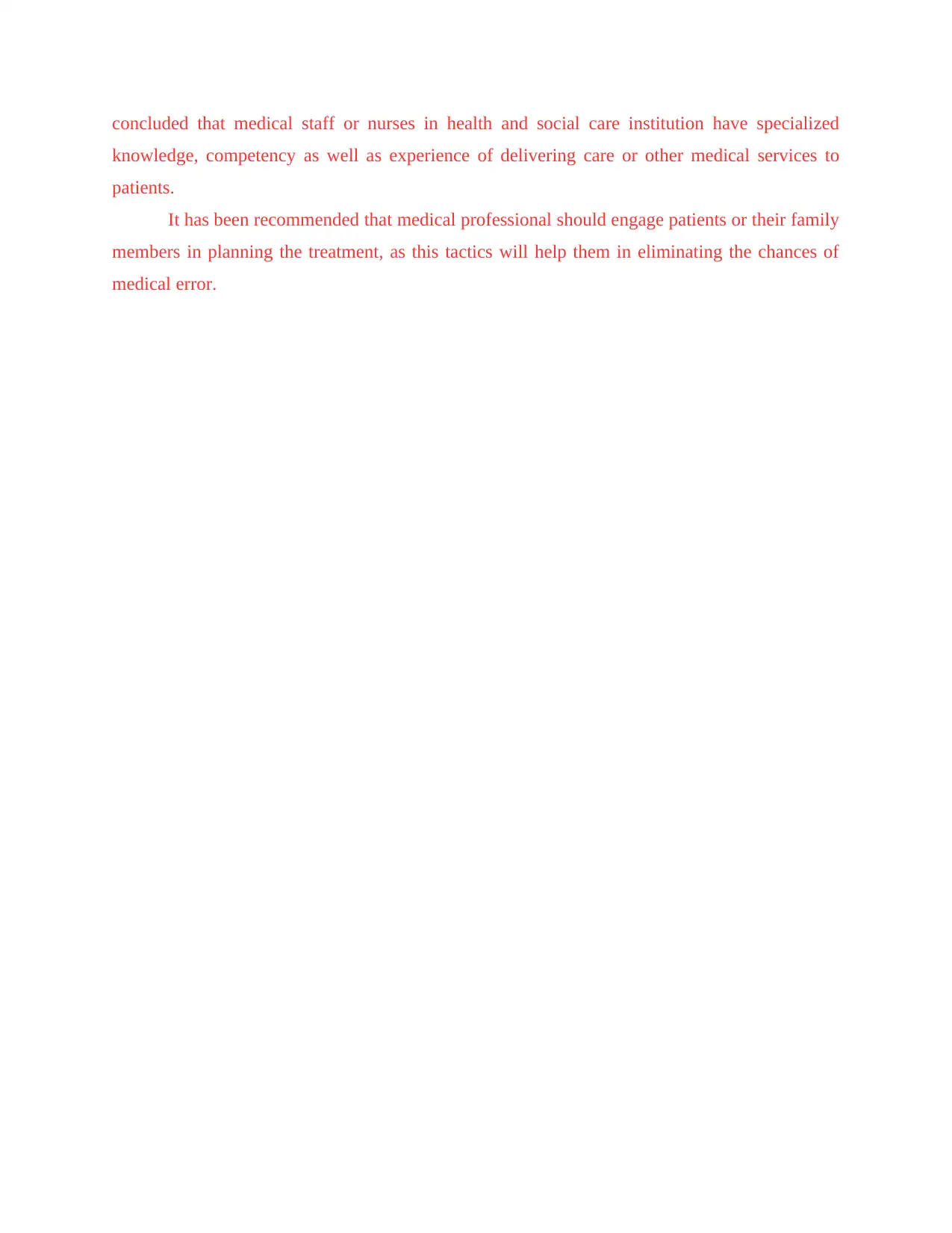
concluded that medical staff or nurses in health and social care institution have specialized
knowledge, competency as well as experience of delivering care or other medical services to
patients.
It has been recommended that medical professional should engage patients or their family
members in planning the treatment, as this tactics will help them in eliminating the chances of
medical error.
knowledge, competency as well as experience of delivering care or other medical services to
patients.
It has been recommended that medical professional should engage patients or their family
members in planning the treatment, as this tactics will help them in eliminating the chances of
medical error.
Paraphrase This Document
Need a fresh take? Get an instant paraphrase of this document with our AI Paraphraser
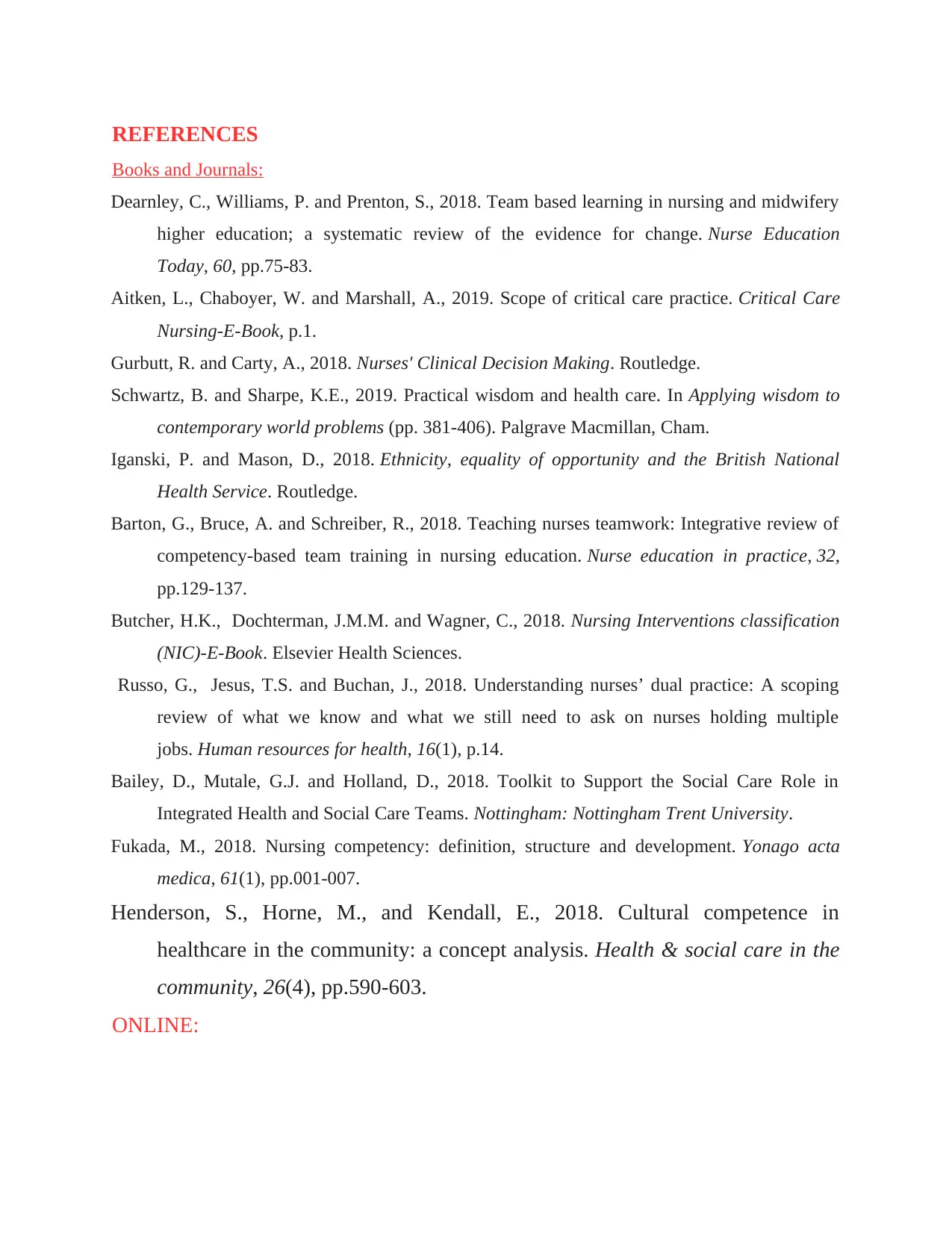
REFERENCES
Books and Journals:
Dearnley, C., Williams, P. and Prenton, S., 2018. Team based learning in nursing and midwifery
higher education; a systematic review of the evidence for change. Nurse Education
Today, 60, pp.75-83.
Aitken, L., Chaboyer, W. and Marshall, A., 2019. Scope of critical care practice. Critical Care
Nursing-E-Book, p.1.
Gurbutt, R. and Carty, A., 2018. Nurses' Clinical Decision Making. Routledge.
Schwartz, B. and Sharpe, K.E., 2019. Practical wisdom and health care. In Applying wisdom to
contemporary world problems (pp. 381-406). Palgrave Macmillan, Cham.
Iganski, P. and Mason, D., 2018. Ethnicity, equality of opportunity and the British National
Health Service. Routledge.
Barton, G., Bruce, A. and Schreiber, R., 2018. Teaching nurses teamwork: Integrative review of
competency-based team training in nursing education. Nurse education in practice, 32,
pp.129-137.
Butcher, H.K., Dochterman, J.M.M. and Wagner, C., 2018. Nursing Interventions classification
(NIC)-E-Book. Elsevier Health Sciences.
Russo, G., Jesus, T.S. and Buchan, J., 2018. Understanding nurses’ dual practice: A scoping
review of what we know and what we still need to ask on nurses holding multiple
jobs. Human resources for health, 16(1), p.14.
Bailey, D., Mutale, G.J. and Holland, D., 2018. Toolkit to Support the Social Care Role in
Integrated Health and Social Care Teams. Nottingham: Nottingham Trent University.
Fukada, M., 2018. Nursing competency: definition, structure and development. Yonago acta
medica, 61(1), pp.001-007.
Henderson, S., Horne, M., and Kendall, E., 2018. Cultural competence in
healthcare in the community: a concept analysis. Health & social care in the
community, 26(4), pp.590-603.
ONLINE:
Books and Journals:
Dearnley, C., Williams, P. and Prenton, S., 2018. Team based learning in nursing and midwifery
higher education; a systematic review of the evidence for change. Nurse Education
Today, 60, pp.75-83.
Aitken, L., Chaboyer, W. and Marshall, A., 2019. Scope of critical care practice. Critical Care
Nursing-E-Book, p.1.
Gurbutt, R. and Carty, A., 2018. Nurses' Clinical Decision Making. Routledge.
Schwartz, B. and Sharpe, K.E., 2019. Practical wisdom and health care. In Applying wisdom to
contemporary world problems (pp. 381-406). Palgrave Macmillan, Cham.
Iganski, P. and Mason, D., 2018. Ethnicity, equality of opportunity and the British National
Health Service. Routledge.
Barton, G., Bruce, A. and Schreiber, R., 2018. Teaching nurses teamwork: Integrative review of
competency-based team training in nursing education. Nurse education in practice, 32,
pp.129-137.
Butcher, H.K., Dochterman, J.M.M. and Wagner, C., 2018. Nursing Interventions classification
(NIC)-E-Book. Elsevier Health Sciences.
Russo, G., Jesus, T.S. and Buchan, J., 2018. Understanding nurses’ dual practice: A scoping
review of what we know and what we still need to ask on nurses holding multiple
jobs. Human resources for health, 16(1), p.14.
Bailey, D., Mutale, G.J. and Holland, D., 2018. Toolkit to Support the Social Care Role in
Integrated Health and Social Care Teams. Nottingham: Nottingham Trent University.
Fukada, M., 2018. Nursing competency: definition, structure and development. Yonago acta
medica, 61(1), pp.001-007.
Henderson, S., Horne, M., and Kendall, E., 2018. Cultural competence in
healthcare in the community: a concept analysis. Health & social care in the
community, 26(4), pp.590-603.
ONLINE:
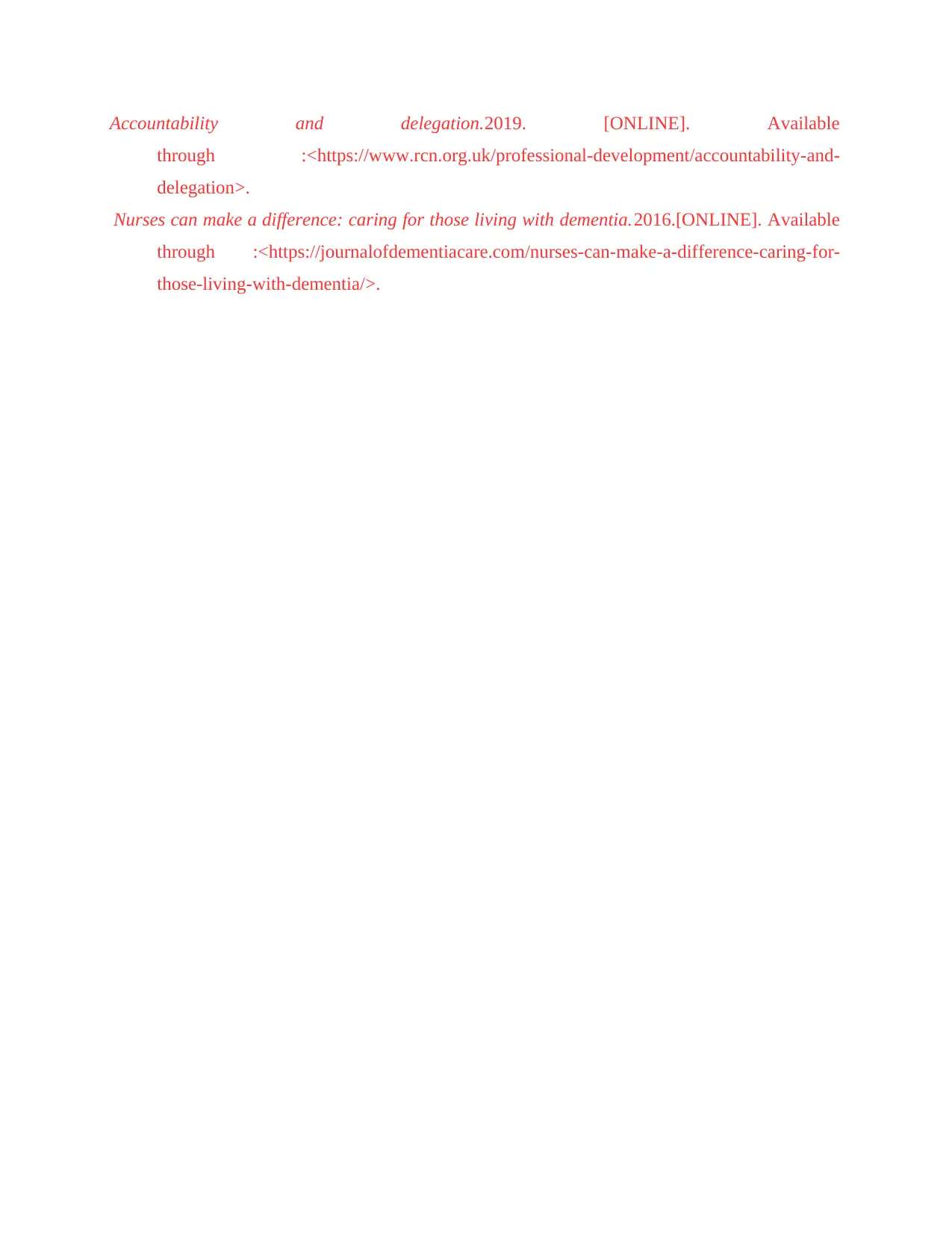
Accountability and delegation.2019. [ONLINE]. Available
through :<https://www.rcn.org.uk/professional-development/accountability-and-
delegation>.
Nurses can make a difference: caring for those living with dementia.2016.[ONLINE]. Available
through :<https://journalofdementiacare.com/nurses-can-make-a-difference-caring-for-
those-living-with-dementia/>.
through :<https://www.rcn.org.uk/professional-development/accountability-and-
delegation>.
Nurses can make a difference: caring for those living with dementia.2016.[ONLINE]. Available
through :<https://journalofdementiacare.com/nurses-can-make-a-difference-caring-for-
those-living-with-dementia/>.
⊘ This is a preview!⊘
Do you want full access?
Subscribe today to unlock all pages.

Trusted by 1+ million students worldwide
1 out of 14
Related Documents
Your All-in-One AI-Powered Toolkit for Academic Success.
+13062052269
info@desklib.com
Available 24*7 on WhatsApp / Email
![[object Object]](/_next/static/media/star-bottom.7253800d.svg)
Unlock your academic potential
Copyright © 2020–2026 A2Z Services. All Rights Reserved. Developed and managed by ZUCOL.




